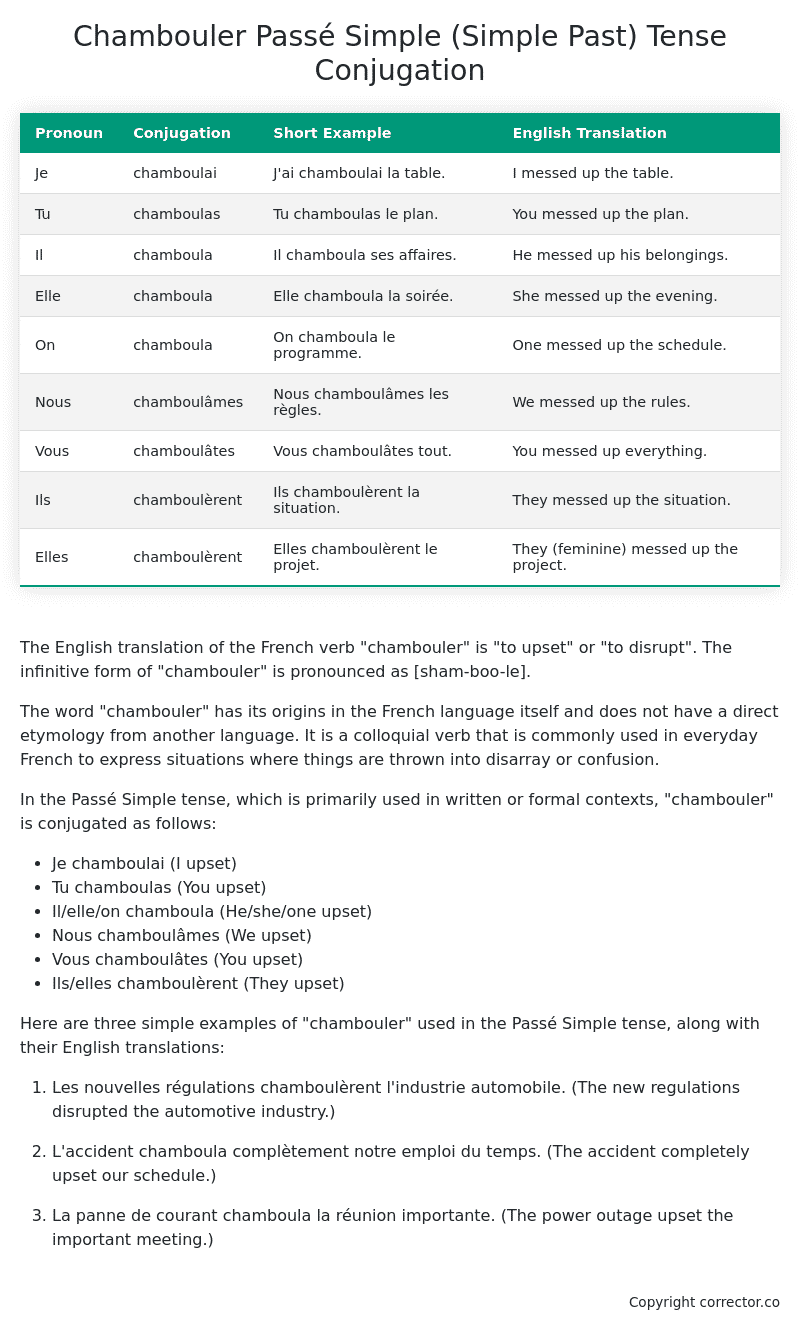Passé Simple (Simple Past) Tense Conjugation of the French Verb chambouler
Introduction to the verb chambouler
The English translation of the French verb “chambouler” is “to upset” or “to disrupt”. The infinitive form of “chambouler” is pronounced as [sham-boo-le].
The word “chambouler” has its origins in the French language itself and does not have a direct etymology from another language. It is a colloquial verb that is commonly used in everyday French to express situations where things are thrown into disarray or confusion.
In the Passé Simple tense, which is primarily used in written or formal contexts, “chambouler” is conjugated as follows:
- Je chamboulai (I upset)
- Tu chamboulas (You upset)
- Il/elle/on chamboula (He/she/one upset)
- Nous chamboulâmes (We upset)
- Vous chamboulâtes (You upset)
- Ils/elles chamboulèrent (They upset)
Here are three simple examples of “chambouler” used in the Passé Simple tense, along with their English translations:
-
Les nouvelles régulations chamboulèrent l’industrie automobile. (The new regulations disrupted the automotive industry.)
-
L’accident chamboula complètement notre emploi du temps. (The accident completely upset our schedule.)
-
La panne de courant chamboula la réunion importante. (The power outage upset the important meeting.)
Table of the Passé Simple (Simple Past) Tense Conjugation of chambouler
| Pronoun | Conjugation | Short Example | English Translation |
|---|---|---|---|
| Je | chamboulai | J’ai chamboulai la table. | I messed up the table. |
| Tu | chamboulas | Tu chamboulas le plan. | You messed up the plan. |
| Il | chamboula | Il chamboula ses affaires. | He messed up his belongings. |
| Elle | chamboula | Elle chamboula la soirée. | She messed up the evening. |
| On | chamboula | On chamboula le programme. | One messed up the schedule. |
| Nous | chamboulâmes | Nous chamboulâmes les règles. | We messed up the rules. |
| Vous | chamboulâtes | Vous chamboulâtes tout. | You messed up everything. |
| Ils | chamboulèrent | Ils chamboulèrent la situation. | They messed up the situation. |
| Elles | chamboulèrent | Elles chamboulèrent le projet. | They (feminine) messed up the project. |
Other Conjugations for Chambouler.
Le Present (Present Tense) Conjugation of the French Verb chambouler
Imparfait (Imperfect) Tense Conjugation of the French Verb chambouler
Passé Simple (Simple Past) Tense Conjugation of the French Verb chambouler (You’re reading it right now!)
Passé Composé (Present Perfect) Tense Conjugation of the French Verb chambouler
Futur Simple (Simple Future) Tense Conjugation of the French Verb chambouler
Futur Proche (Near Future) Tense Conjugation of the French Verb chambouler
Plus-que-parfait (Pluperfect) Tense Conjugation of the French Verb chambouler
Passé Antérieur (Past Anterior) Tense Conjugation of the French Verb chambouler
Futur Antérieur (Future Anterior) Tense Conjugation of the French Verb chambouler
Subjonctif Présent (Subjunctive Present) Tense Conjugation of the French Verb chambouler
Subjonctif Passé (Subjunctive Past) Tense Conjugation of the French Verb chambouler
Subjonctif Imparfait (Subjunctive Imperfect) Tense Conjugation of the French Verb chambouler
Subjonctif Plus-que-parfait (Subjunctive Pluperfect) Tense Conjugation of the French Verb chambouler
Conditionnel Présent (Conditional Present) Tense Conjugation of the French Verb chambouler
Conditionnel Passé (Conditional Past) Tense Conjugation of the French Verb chambouler
Conditionnel Passé II (Conditional Past II) Tense Conjugation of the French Verb chambouler
L’impératif Présent (Imperative Present) Tense Conjugation of the French Verb chambouler
L’impératif Passé (Imperative Past) Tense Conjugation of the French Verb chambouler
L’infinitif Présent (Infinitive Present) Tense Conjugation of the French Verb chambouler
L’infinitif Passé (Infinitive Past) Tense Conjugation of the French Verb chambouler
Le Participe Présent (Present Participle) Tense Conjugation of the French Verb chambouler
Le Participe Passé (Past Participle) Tense Conjugation of the French Verb chambouler
Struggling with French verbs or the language in general? Why not use our free French Grammar Checker – no registration required!
Get a FREE Download Study Sheet of this Conjugation 🔥
Simply right click the image below, click “save image” and get your free reference for the chambouler Passé Simple tense conjugation!

Chambouler – About the French Passé Simple (Simple Past) Tense
Formation
Usage
Narration
Historical Context
Interactions with other tenses
Passé Composé
Imparfait
Conditional and Subjunctive
Summary
I hope you enjoyed this article on the verb chambouler. Still in a learning mood? Check out another TOTALLY random French verb conjugation!


